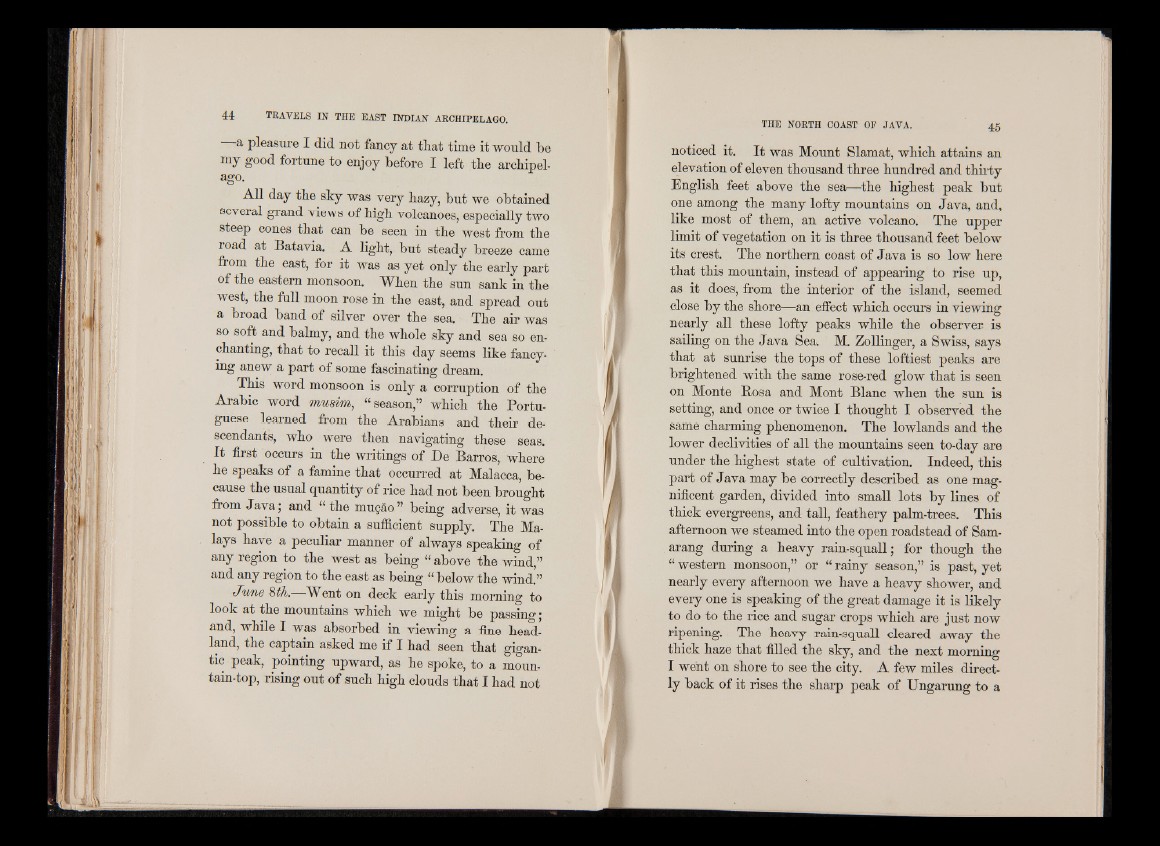
a pleasure I did not fancy at that time it would he
my good fortune to enjoy before I left the archipelago.
All day the sky was very hazy, but we obtained
several grand views of high volcanoes, especially two
steep cones that can be seen in the west from the
road at Batavia. A light, but steady breeze came
from the east, for it was as yet only the early part
of the eastern monsoon. When the sun sank in the
west, the full moon rose in the east, and spread out
a broad band of silver over the sea. The air was
so soft and balmy, and the whole sky and sea so enchanting,
that to recall it this day seems like fancy-
ing anew a part of some fascinating dream.
This word monsoon is only a corruption of the
Arabic word musim^ “ season,” which the Portuguese
learned from the Arabians and their descendants,
who were then navigating these seas.
It first occurs in the writings of De Barros, where
he speaks of a famine that occurred at Malacca, because
the usual quantity of rice had not been brought
from Jav a ; and “ the mugao ” being adverse, it was
not possible to obtain a sufficient supply. The Malays
have a peculiar manner of always speaking of
any region to the west as being “ above the wind ”
and any region to the east as being “below the wind.”
tTv/ne 8 th.—Went on deck early this morning to
look at the mountains which we might be passing;
and, while I was absorbed in viewing a fine headland,
the captain asked me if I had seen that gigantic
peak, pointing upward, as he spoke, to a mountain
top, rising out of such high clouds that I had not
noticed it. It was Mount Slamat, which attains an
elevation of eleven thousand three hundred and thirty
English feet above the sea—the highest peak but
one among the many lofty mountains on Java, and,
like most of them, an active volcano. The upper
limit of vegetation on it is three thousand feet below
its crest. The northern coast of Java is so low here
that this mountain, instead of appearing to rise up,
as it does, from the interior of the island, seemed
close by the shore—an effect which occurs in viewing
nearly all these lofty peaks while the observer is
sailing on the Java Sea. M. Zollinger, a Swiss, says
that at sunrise the tops of these loftiest peaks are
brightened with the same rose-red glow that is seen
on Monte Bosa and Mont Blanc when the sun is
setting, and once or twice I thought I observed the
same charming phenomenon. The lowlands and the
lower declivities of all the mountains seen to-day are
under the highest state of cultivation. Indeed, this
part of Java may be correctly described as one magnificent
garden, divided into small lots by lines of
thick evergreens, and tall, feathery palm-trees. This
afternoon we steamed into the open roadstead of Sam-
arang during a heavy rain-squall; for though the
“ western monsoon,” or “ rainy season,” is past, yet
nearly every afternoon we have a heavy shower, and
every one is speaking of the great damage it is likely
to do to the rice and sugar crops which are just now
ripening. The heavy rain-squall cleared away the
thick haze that filled the sky, and the next morning
I went on shore to see the city. A few miles directly
back of it rises the sharp peak of Ungarung to a